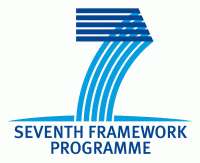
activities
publicity
IDEAS internal web site
| seventh framework programme |
 |
 |
FP7 has some key differences to earlier EU research programmes, including:
FP7 still retains the important elements of earlier Framework research programmes. The same emphases remain on consortia of European partners, collaboration across borders, open coordination, flexibility and excellence of research.
The priorities in FP7 are contained within several specific programmes, as follows: Cooperation programme – the core of FP7 The core of FP7 and its largest component by far, the Cooperation programme fosters collaborative research across Europe and other partner countries, according toseveral key thematic areas. These themes are: health; food, agriculture and fisheries, and biotechnology; information and communications technologies; nanosciences, nanotechnologies, materials and new production technologies; energy; environment (including climate change); transport (including aeronautics); socio-economic sciences and the humanities; space and security. This programme also includes the new Joint Technology Initiatives, which are industrydriven, large-scale multi-financed actions, supported in certain cases by a mix of public and private funding. Other highlights of this programme include Coordination of non-community research programmes, which aims to bring European national and regional research programmes closer together (e.g. ERA-NET), and the Risk-sharing
Special attention is also being paid to multi-disciplinary and cross-theme research, including joint calls for proposals between themes.
Ideas programme – and the European Research Council (ERC) The Ideas programme is the first time an EU Framework research programme has funded pure, investigative research at the frontiers of science and technology, independently of thematic priorities. As well as bringing such research closer to the conceptual source, this flagship FP7 programme is a recognition of the value of basic research to society’s economic and social welfare. The Ideas programme is uniquely flexible in its approach to EU research, in that proposed research projects are judged solely on the basis of their excellence, as judged by peer review. It is being implemented by the new European Research Council (ERC), which consists of a Scientific Council (to plan scientific strategy, establish the work programme, quality control and information activities) and an implementing agency (administration, support for applicants, proposal eligibility, grant management and practical organisation).
People programme – boosting European research careers The People programme provides significant support for research mobility and career development, both for researchers inside the European Union and externally. It is being implemented via a coherent set of Marie Curie actions, designed to help researchers build their skills and competences throughout their careers. The programme includes activities such as initial researcher training, support for lifelong training and development via trans-national European fellowships and other actions, and industry/academia partnerships. An international dimension with partners outside the EU is to further develop the careers of EU researchers, by creating international outgoing and incoming fellowships to foster collaboration with research groups outside Europe.
Capacities programme – building the knowledge economy The Capacities programme is designed to help strengthen and optimise the knowledge capacities that Europe needs if it is to become a thriving knowledge-based economy. By strengthening research abilities, innovation capacity and European competitiveness, the programme is stimulating Europe’s full research potential and knowledge resources. The programme embraces six specific knowledge areas, including Research Infrastructures, Research for the benefit of SMEs, Regions of Knowledge, Research Potential, Science in Society and International Cooperation activities.
Nuclear research This specific programme comprises two parts – the first part focusing on nuclear fusion and the international ITER research facility which is to be constructed in Europe. The objectives are to develop the knowledge base on nuclear fusion, and to realise the experimental ITER fusion reactor. ITER is set to be the biggest research project on Earth. The second part of the programme covers nuclear safety, waste management for nuclear fission facilities, and radiation protection. The Joint Research Centre's activities in this area include developing a European-level view on management and disposal of radioactive waste, maintaining safe operation of nuclear facilities, and supporting further research into nuclear power. For more information on these and more JRC activities. |
